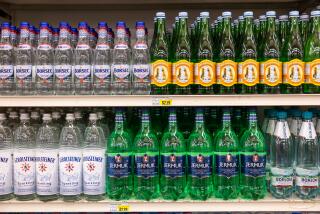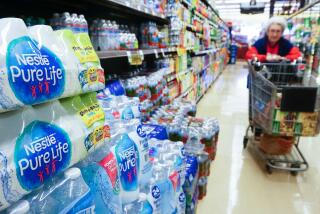Water, Water Everywhere--Is It Fit to Drink?
- Share via
Just when many of us had finally trained ourselves to drink bottled water overseas came the news last year that bottled water isn’t always perfect. If Perrier can contain impurities, is anything safe?
Well, yes. But just because water is sold in a bottle labeled “spring,” “pure,” “mineral” or “natural” doesn’t mean it cannot make us sick.
Generally, bottled water comes from either ground springs or is processed tap water. For such water to be pure, the springs must be continually monitored and/or the water carefully purified. Otherwise, it may not be any safer than tap water.
Bottled water generally is safer while traveling because tap water everywhere contains microorganisms which, if sufficiently different from those in your tap water at home, may cause intestinal upset.
If you can find them, known bottled-water brand names such as Evian, Montecantini, Vittel and, yes, Perrier, are probably safest to drink, especially in developing countries. Those companies use sophisticated techniques to remove potentially harmful chemicals and microorganisms from water, techniques that local bottlers may not.
Insist that bottles be opened in your presence to ensure that bottles are not filled with tap water.
Some hotels in developing countries provide unsealed canisters of water in guest rooms. But even if the water is safe--and it may not be--the canisters may be unclean. In countries where sanitation is poor, double check water safety and if in doubt, do not drink the water in the canisters or use it for brushing teeth or cleaning contact lenses.
Generally, deluxe hotels in developing countries purify tap water but systems may break down. It probably is safer to drink bottled water. It also makes sense to drink bottled water at airports and on flights originating in developing countries.
When only local brands are available, drink carbonated bottled water or soft drinks. Carbonation acidifies water and can kill some microorganisms.
Minerals in water do not kill microorganisms or prevent disease and may increase the cost. In addition, some minerals may not be healthy for people with heart and kidney conditions and those taking certain medications. Ask your physician if there are any minerals you should avoid.
Ice cubes are generally made from tap water and as such, may not be safe. But if you must have a cold drink, carry clean, leakproof plastic bags with you and place cubes inside one before placing the bag in your drink.
Carry an electric immersion coil to boil water for making coffee or tea or for brushing teeth. Boiling for five minutes or, at high altitudes, 10 minutes will help kill microorganisms. Coils are available in many department stores but probably will require a current converter and a plug adapter to make them work.
Use chlorine bleach, tincture of iodine or commercial water purification tablets (Halazone, for example) to disinfect water when boiling is not feasible. Add two drops of 5% chlorine bleach or five drops of 2% tincture of iodine to a quart of water and let stand for 30 minutes before using. But remember: Like heat, chemicals can kill microorganisms but have little or no effect on chemical impurities. So your best bet for safety probably remains drinking bottled water.
More to Read
Eat your way across L.A.
Get our weekly Tasting Notes newsletter for reviews, news and more.
You may occasionally receive promotional content from the Los Angeles Times.










